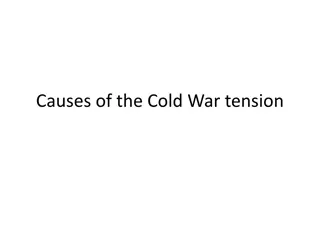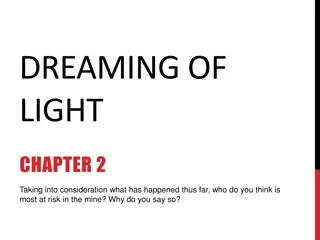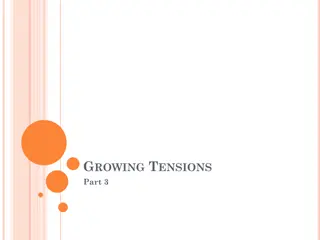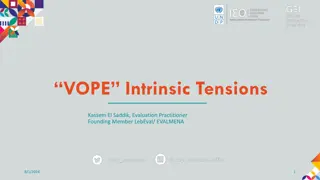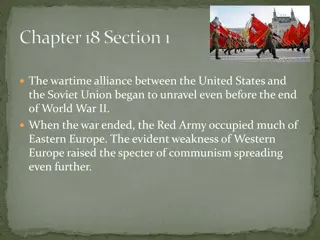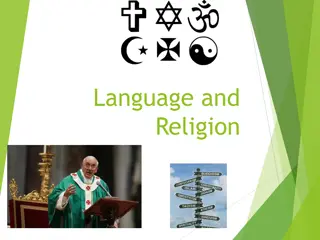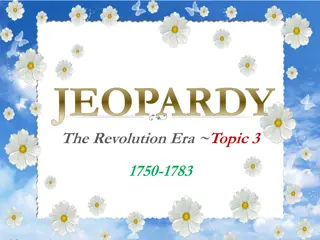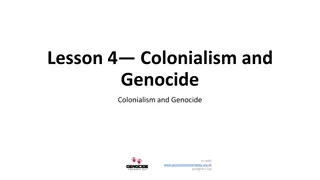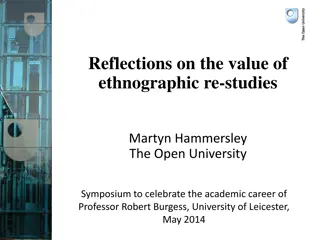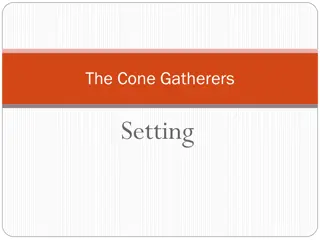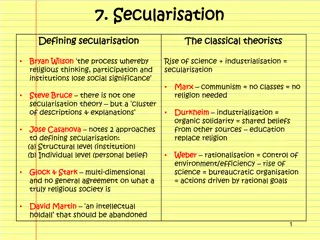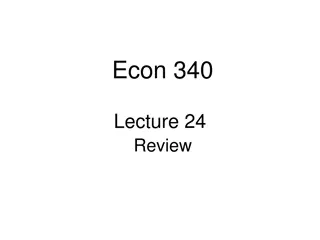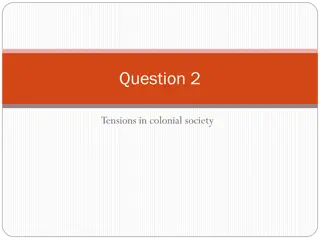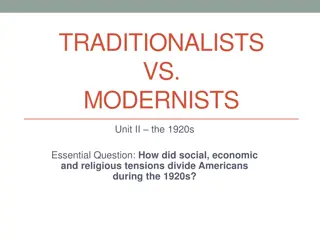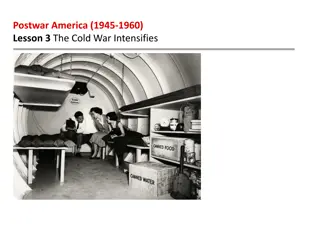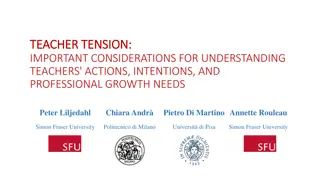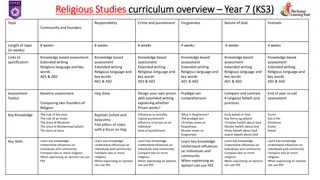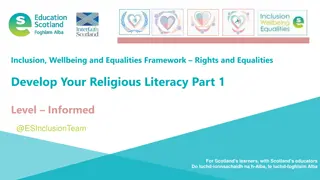Status of Family Laws in India: Hindu vs. Religious Minorities
The family and personal status laws in India vary between Hindu law and those pertaining to religious minorities. While Hindu law has seen extensive reforms, discriminatory provisions still exist. In contrast, laws governing religious minorities have undergone fewer reforms, leading to greater inequ
2 views • 4 slides
Tensions in UK Fire Prevention: Transactional vs. Relational Approaches
Exploring the tensions between transactional and relational approaches in UK fire prevention, this presentation shares insights from a case study at Nottinghamshire Fire and Rescue Service. Seeking feedback on relevant literature, it delves into the NFCC Person-Centred Framework, literature on fire
3 views • 16 slides
Understanding Cold War Tensions: Causes, Events, and Decisions
Explore the complex dynamics of the Cold War era through a series of questions and analyses. Uncover the factors behind the hostile relations between the USA and the Soviet Union from 1945 to 1949, including the Berlin Blockade and key conferences like Yalta and Potsdam. Delve into the breakdown of
0 views • 33 slides
Understanding Religious Conflict: Definition and Types Explored
Religious conflict is a complex and recurring concept throughout history. Scholars have defined it as disagreements between religious groups. This conflict arises from contentious issues touching on ideology, morality, power, and identity, influenced by various socio-political, economic, and cultura
1 views • 13 slides
Evolution of Akbar's Religious Policy: A Historical Overview
In the 16th century, Akbar the Great implemented a revolutionary religious policy in the Mughal Empire. Initially a devout Sunni Muslim, Akbar evolved his stance to promote harmony and equality among all religions, fostering tolerance and understanding. This shift marked a significant departure from
0 views • 25 slides
Elizabethan Religious Settlement: Unity Amidst Division
Amid religious division in England, Queen Elizabeth I implemented a Religious Settlement in 1559 to unify the country. The settlement, a blend of Protestant and Catholic elements, aimed to maintain peace and prevent rebellions. Elizabeth's strategic compromise pleased most people, though lingering t
0 views • 14 slides
Understanding Secularism: Principles and Advantages
Secularism is the principle of separating government institutions from religious entities to ensure equal rights for believers and non-believers. It safeguards freedom of religious belief and practice, upholds religious freedom, and promotes democracy and fairness. Secularism aims to prevent religio
0 views • 21 slides
Tensions Rise in the Mine: A Closer Look at "Dreaming of Light" Chapter 2
In Chapter 2 of "Dreaming of Light," tensions escalate in the mine as Faceman's brutal behavior and Regile's stoicism create a volatile environment. The miners, particularly Taiba, face heightened risks as they navigate power dynamics and harsh working conditions. The narrative delves into themes of
0 views • 11 slides
Understanding Religious Language: Cognitivism vs. Non-Cognitivism in the University Debate
This discussion explores the debate between cognitivism and non-cognitivism in religious language. Cognitivism asserts that religious claims aim to describe the world and can be true or false, while non-cognitivism argues that such claims express attitudes and cannot be verified. Flew's challenge qu
0 views • 9 slides
Growing Tensions: Austin's Struggle for Texas Independence
Stephen F. Austin faces challenges in his mission to Mexico City, leading to his imprisonment and eventual release. Reforms begin in Texas, but trouble erupts again as tensions rise between Texas and Mexico.
0 views • 11 slides
Challenges and Resilience of Evaluation Associations: Insights from VOPEs
Despite the growing number of registered VOPEs worldwide, there are significant challenges faced by Evaluation Associations, including tensions between standardization and specificity, balancing diverse interests, and adapting to external pressures. Key observations highlight the need for stronger r
0 views • 6 slides
Guide to Using the BSA Calendar of Religious Observances
The BSA Calendar of Religious Observances is a valuable resource for scheduling scouting events in consideration of various religious holidays and observances. This guide provides an overview of the calendar, highlights important dates, and emphasizes the importance of respecting religious diversity
0 views • 8 slides
Overview of the Cold War: Tensions, Divisions, and Key Events
The Cold War was characterized by the rocky relationship between the U.S. and the Soviet Union, the division of Germany and Poland, the concept of the Iron Curtain, the Truman Doctrine, military alliances like NATO and the Warsaw Pact, and the political dynamics of the Korean War. Tensions over diff
0 views • 17 slides
The Unraveling of the Wartime Alliance and the Beginnings of the Cold War
The chapter delves into the breakdown of the wartime alliance between the United States and the Soviet Union post-World War II. Tensions rose as the Red Army occupied Eastern Europe and communism seemed to spread. The Marshall Plan's role in restoring Western Europe, coupled with events like the Cze
1 views • 15 slides
The Cold War Expansion and Nuclear Arms Race
The Cold War intensified as the Soviet Union detonated an atomic bomb, leading to heightened tensions. Communist advancements, including the takeover of communist China, shocked the world. Nuclear arsenals expanded with the development of the hydrogen bomb, sparking concerns of an arms race. Eisenho
0 views • 17 slides
Understanding the Role of Language in Religion
Exploring the significance of language in religious contexts, this content discusses the functions, features, lexicon, grammar, and metaphorical aspects present in religious language. It delves into how religious language upholds spiritual beliefs, persuades believers, and expresses specific attitud
0 views • 8 slides
Revolutionary Era Jeopardy: French & Indian War, Tensions, and Colonist Reactions
Explore the pivotal events of the Revolutionary Era through a Jeopardy game format, covering topics such as the French & Indian War, colonial tensions with Britain, and the reactions of the colonists leading to the Revolutionary War. Test your knowledge on key milestones and historical facts that sh
0 views • 28 slides
Understanding the Cultural Dimensions of Food and Religious Influences in Culinary Arts
Explore the impact of religious beliefs on food traditions and dietary restrictions across different cultures in the culinary world. Learn about the influence of major world religions on eating habits, food choices, and culinary practices. Discover how various religious groups, such as Christians, o
0 views • 26 slides
Tensions and Compromises in US History
The content covers key events in US history such as the Missouri Compromise, Mexican-American War, Compromise of 1850, and notable figures like John C. Calhoun and Daniel Webster. It highlights the debates and compromises surrounding slavery, territorial disputes, and the balance of power between fr
0 views • 18 slides
Growing Colonial Resistance and Tensions in America
Colonial resistance in America escalated with the Townshend Acts, protests, the Boston Massacre, the Tea Act, and the formation of Committees of Correspondence. Tensions between the colonists and British authorities further intensified as acts of rebellion and British responses fueled the flames of
0 views • 7 slides
Colonialism and Genocide: Impact of Divide and Rule in Rwanda
Colonialism in Rwanda exploited existing divisions between the Hutu and Tutsi, leading to heightened tensions and manipulation by the colonial government. This ultimately contributed to the genocide in Rwanda, which was not a sudden event but the culmination of years of historical tensions and explo
0 views • 12 slides
The Vital Role of Religious Institutions in Supporting Immigrants
Religions and immigration are interlinked in modern societies, where religions play a significant role in providing services, defending rights, and supporting the social cohesion of immigrants. Mainstream religious institutions serve as key actors in offering assistance, advocating for migrant right
2 views • 14 slides
Understanding Religious Language: Flew, Hare, Mitchell
Exploring the contrasting views of cognitivism and non-cognitivism in the context of religious language through the perspectives of Flew, Hare, and Mitchell. Delve into Flew's challenge on the undetectable gardener, Hare's concept of bliks, and Mitchell's response to the rationality of religious bel
0 views • 7 slides
Religious Accommodation in the Army: Advising Command
The content discusses the role of the Chaplain Corps in advising Soldiers and leaders on religious accommodation in the Army as of February 13, 2019. It covers learning objectives, legal foundations, Army policies, procedures, recent changes, and references related to religious accommodation. The in
0 views • 36 slides
Value of Ethnographic Re-Studies: Exploring Tensions and Contradictions in Social Research
Ethnographic re-studies play a crucial role in examining changes over time and exploring new dimensions of a case. However, tensions arise due to challenges in replicating the original study, changes in the community, and variations in findings based on researchers' perspectives. Classic controversi
0 views • 13 slides
Themes and Conflict in "The Cone Gatherers
The setting of "The Cone Gatherers" plays a crucial role in shaping the themes of beauty, conflict, and social class divisions. Initially depicted as idyllic, the forest transforms into a battleground where characters like Duror spiral into obsession and madness. The imagery of the silver firs symbo
0 views • 13 slides
Understanding Religious Discrimination Laws in California Workplace
Learn about the regulations and protections under FEHA and Title VII in California, including religious exemptions, accommodation requirements, case studies, and best practices to address discrimination issues effectively. Discover the statistical insights on religious discrimination complaints and
0 views • 45 slides
Understanding Secularisation: The Decline of Religious Influence in Society
Secularisation refers to the process in which religious thinking, participation, and institutions lose their social significance. This phenomenon is influenced by factors such as the rise of science, industrialisation, changing social attitudes, and the disengagement of the church from society. Evid
0 views • 8 slides
Philosophers' Views on Religious Experience: Insights and Critiques
This lesson delves into the perspectives of various philosophers such as Rudolph Otto, Richard Swinburne, John Hick, and Michael Persinger on religious experiences. It explores concepts like the numinous, religious knowledge, God's existence, and criticisms on the validity of religious experiences.
0 views • 7 slides
Philosophers' Views on Religious Experience: Insights from William James
Explore William James' perspective on religious experiences, including his views on existential and value judgments. Understand how James argued for the validity of religious experiences and their potential proof of God's existence. Delve into the implications of emotions and prior beliefs on interp
0 views • 7 slides
Religious and Social Conflicts Fueling the Rise of Absolutism in Europe
Social, economic, and religious conflicts in Europe played a significant role in the emergence of absolutism where monarchs wielded supreme power without sharing it with legislative bodies. Events like Spain's religious conflicts, Protestantism in England, the Spanish Armada, religious conflict in t
0 views • 10 slides
Understanding International Economics: Review and Analysis
Explore key topics in international economics such as the world economy, current tensions, and gains from trade. Topics include global trade patterns, trade relationships, economic models, trade tensions, and comparative advantage. Dive into terms, acronyms, and questions related to these concepts f
0 views • 48 slides
Comparative Analysis of Colonial Society Tensions
Explore the reflections of tensions in colonial society through the events of Bacon's Rebellion, Pueblo Revolt, Salem Witchcraft Trials, and Stono Rebellion. Each event, marked by unique conflicts and outcomes, illuminates the underlying societal struggles of the time, encompassing issues of power,
0 views • 13 slides
Social Divisions in 1920s America: Traditionalists vs. Modernists
In the 1920s, American society was divided along social, economic, and religious lines, leading to tensions between traditionalists and modernists. Traditionalists upheld long-held cultural and religious values as anchors of stability, while modernists embraced new ideas and trends, viewing traditio
0 views • 14 slides
Religious Pluralism and Civil Society: A Paradox in Government Control
Understanding the intricacies of religious pluralism in the context of government control reveals a paradox where restricting religion can hinder social cohesion and economic growth. Through insights on the counterproductivity of control, the role of religious organizations in civil society, and the
0 views • 16 slides
The Cold War Escalates: Postwar America 1945-1960 Lesson 3
The period after World War II saw tensions intensify between the United States and the Soviet Union, leading to a global struggle for influence. The arms race, the space race, and significant international conflicts all heightened Cold War tensions. President Eisenhower's response to communism diffe
0 views • 17 slides
US Religious Freedom Restoration Act (RFRA) Overview
The US Religious Freedom Restoration Act (RFRA) aims to protect the free exercise of religion by ensuring that governments do not substantially burden religious practices without compelling justification. It emphasizes striking a balance between religious liberty and governmental interests through t
0 views • 9 slides
Understanding Teacher Tensions and Professional Growth Needs
Teachers often face tensions between their ideals and practical constraints, which impact their decisions and professional growth. Recognizing and managing these tensions are crucial for their development. Researchers emphasize the complexity of dilemmas in teaching practice and the role of tensions
0 views • 28 slides
Religious Studies Curriculum Overview for Year 7 and 8 (KS3)
Explore various topics such as responsibility, crime and punishment, forgiveness, nature of God, festivals, community, founders, worship, creation, life after death, rules and laws, relationships in this detailed Year 7 and 8 (KS3) Religious Studies curriculum. The curriculum includes assessments, e
0 views • 6 slides
Developing Religious Literacy for Educators in Scotland
This resource aims to enhance educators' understanding of religious literacy by exploring religious discrimination, core beliefs of major faiths, and additional learning sources. It encourages educators to consider the needs of learners in relation to their religious beliefs in Scotland.
0 views • 30 slides


